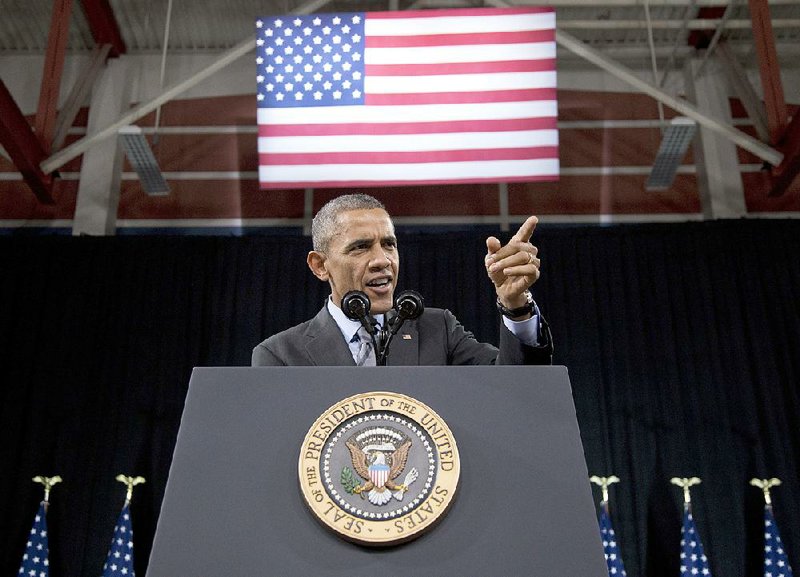WASHINGTON -- President Barack Obama's administration said Tuesday that it will ask the Supreme Court to save its plans to shield from deportation millions of illegal aliens.
The appeal advances a legal confrontation with 26 states during a presidential race in which U.S. immigration policy has been a key issue.
The 5th U.S. Circuit Court of Appeals late Monday blocked Obama's plan to protect as many as 5 million illegal aliens, primarily the parents of U.S. citizens and legal permanent residents. It upheld a Texas-based federal judge's earlier injunction.
"The Department of Justice remains committed to taking steps that will resolve the immigration litigation as quickly as possible in order to allow [the Department of Homeland Security] to bring greater accountability to our immigration system by prioritizing the removal of the worst offenders, not people who have long ties to the United States and who are raising American children," said Patrick Rodenbush, a spokesman for the Justice Department.
The ruling leaves in limbo the future of the program, called the Deferred Action for Parents of Americans.
The future of the 11 million people estimated to live in the U.S. illegally has been debated by Republican and Democratic presidential candidates. Earlier this month, Sen. Marco Rubio, R-Fla., said that if elected, he would eventually end Obama's Deferred Action for Childhood Arrivals, which protects from deportation those brought to the country illegally as children.
Democratic candidate Hillary Rodham Clinton has said she would go further than Obama to protect large groups of migrants from deportation.
Clinton said in May that she would expand Obama's executive actions if Congress does not overhaul U.S. immigration laws. In October, she also pledged that if she were elected, she would be "less harsh and aggressive" than Obama in enforcing immigration laws.
Clinton said Tuesday that she hopes the case gets a quick and fair hearing "so that the millions who are affected can stop living in fear of their families being broken apart."
The Deferred Action for Childhood Arrivals was seen as an administrative answer to the DREAM Act, legislation once supported by Rubio that would provide legal status to those young migrants. To date, more than 720,000 in that category have been granted permission to live and work legally in the United States. That program is not affected by the appeals court ruling.
White House spokesman Josh Earnest said Tuesday that the case was about the administration's authority to decide how to use its limited resources in immigration enforcement.
"We obviously continue to believe strongly in the legal power of the arguments that we have been making for nearly a year ... about the importance of giving our law enforcement officials the discretion to implement our immigration laws in a way that focuses on those who pose a genuine threat to our national security or to our communities," Earnest said.
Monday's 70-page ruling rejected administration arguments that the district court had abused its discretion with a nationwide order and that the states lacked standing to challenge Obama's executive orders.
It acknowledged that an adverse ruling would discourage potential beneficiaries of Deferred Action for Parents of Americans from cooperating with law enforcement authorities or paying taxes.
"But those are burdens that Congress knowingly created, and it is not our place to second-guess those decisions," U.S. Circuit Judge Jerry Smith wrote for the majority. Smith was appointed to the court by Republican President Ronald Reagan.
In a 53-page dissent, Circuit Judge Carolyn Dineen King said the administration was within the law. She cast the decision to defer action on some deportations as "quintessential exercises of prosecutorial discretion" and noted that the Homeland Security Department has limited resources.
"Although there are approximately 11.3 million removable aliens in this country today, for the last several years Congress has provided the Department of Homeland Security with only enough resources to remove approximately 400,000 of those aliens per year," wrote King, who was appointed by Democratic President Jimmy Carter.
It's unclear when the Justice Department will file its appeal or whether the high court would take up the case, but the administration may be running out of time to get a final decision before Obama leaves office in early 2017.
During the past budget year, which ended in September, the administration removed about 231,000 illegal aliens, according to internal government documents obtained by The Associated Press. It was the fewest number of deportations since 2006 and a 42 percent drop from a record high of more than 409,000 in 2012.
Information for this article was contributed by Kevin McGill of The Associated Press and by Michael D. Shear of The New York Times.
A Section on 11/11/2015

